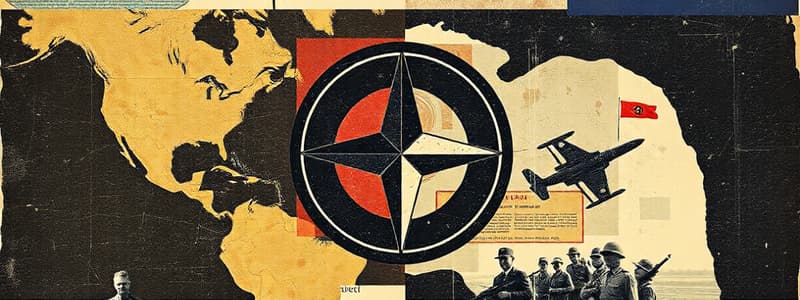Podcast
Questions and Answers
What is the primary mission of NATO?
What is the primary mission of NATO?
- Cultural exchange and promotion.
- Economic collaboration among member states.
- Environmental sustainability initiatives.
- Collective defense among member nations. (correct)
Which of the following countries was a founding member of NATO?
Which of the following countries was a founding member of NATO?
- Greece
- Finland
- Iceland (correct)
- Spain
What event led to the recent expansion of NATO including Finland?
What event led to the recent expansion of NATO including Finland?
- A significant change in US foreign policy.
- The signing of the Paris Agreement.
- Russia's invasion of Ukraine. (correct)
- The establishment of the European Union.
Which article of the North Atlantic Treaty defines the 'Bündnisfall'?
Which article of the North Atlantic Treaty defines the 'Bündnisfall'?
How does Finland's membership affect NATO?
How does Finland's membership affect NATO?
What is Russia's stance on Finland joining NATO?
What is Russia's stance on Finland joining NATO?
Which of the following is NOT a focus area of NATO?
Which of the following is NOT a focus area of NATO?
What kind of support does NATO provide according to the 'Bündnisfall'?
What kind of support does NATO provide according to the 'Bündnisfall'?
What is required for NATO troop deployment?
What is required for NATO troop deployment?
Which event led to the invocation of the 'Bündnisfall'?
Which event led to the invocation of the 'Bündnisfall'?
Under which circumstance do some NATO members consider military intervention in Ukraine?
Under which circumstance do some NATO members consider military intervention in Ukraine?
What must aspirant states fulfill to be considered for NATO membership?
What must aspirant states fulfill to be considered for NATO membership?
What concern does NATO have regarding involvement in the Ukraine war?
What concern does NATO have regarding involvement in the Ukraine war?
Which statement reflects Germany's obligations regarding military assistance to Ukraine if it joins NATO?
Which statement reflects Germany's obligations regarding military assistance to Ukraine if it joins NATO?
What has been NATO's stance on Ukraine's potential membership?
What has been NATO's stance on Ukraine's potential membership?
Why is NATO's role considered more relevant now?
Why is NATO's role considered more relevant now?
Flashcards are hidden until you start studying
Study Notes
NATO: The North Atlantic Treaty Organization
- The NATO is the world's most important security alliance, guaranteeing peace, democracy and freedom for its members for over 70 years.
- The alliance's core mission is collective defense - members support each other in case of an attack, military counter-attack being the last resort.
- The NATO also focuses on crisis prevention, promoting stability and crisis management, working with non-NATO states and organizations to foster global security.
- The European Union is deemed an indispensable partner for the NATO.
Origin and Membership
- NATO stands for North Atlantic Treaty Organization, established on April 4, 1949, in Washington.
- Founding members include Belgium, Denmark, France, Great Britain, Iceland, Italy, Canada, Luxembourg, Netherlands, Norway, Portugal, and the US.
- Greece and Turkey joined in 1952, followed by West Germany as the 15th member in 1955.
- Continuous expansion led to the inclusion of Finland as the 31st member on April 4, 2023, exactly 74 years after NATO's founding.
- The expansion of the alliance, particularly towards the North, is linked to Russia's invasion of Ukraine, effectively doubling the NATO's outer border with Russia.
Impact of Finland's Membership
- Joining the alliance strengthens Finland's security and makes NATO stronger.
- Finland possesses highly capable armed forces and sturdy democratic institutions, bringing valuable assets to the alliance.
- Germany, a core member of NATO, benefits from a strengthened alliance, considering the North Atlantic Treaty as a cornerstone of its security and defense policy.
- German contributions to the alliance include participation in exercises, multinational NATO missions, and providing crucial support in various areas like maritime operations, air policing, and ground forces for securing NATO territories.
The Alliance's Response to Russia
- Russia's negative reaction to Finland's membership, labeling it as a provocation, is considered mere propaganda.
- The NATO is a defensive alliance; there is no imminent military threat from the alliance, unless provoked by Russia.
Article 5: The "Bündnisfall"
- The "Bündnisfall" signifies an attack on one member of the alliance (like Germany) is considered an attack on all members, triggering collective support as a team.
- Defined in Article 5 of the North Atlantic Treaty, the "Bündnisfall" necessitates collective action but not necessarily military intervention.
- Each NATO member can independently decide on the form of support they provide, including military options.
- The "Bündnisfall" was invoked only once in response to the September 11, 2001, attacks on the World Trade Center and the Pentagon, including AWACS reconnaissance flights over US airspace with German participation.
The NATO and the Ukraine War
- The NATO operates on consensus; troop deployment requires unanimous agreement among all member states.
- Current opinions on military intervention in the Ukraine war vary among member states.
- All members favor a political solution, though some might support military intervention under certain circumstances.
- The risk of escalation is a major concern, as NATO involvement in the Ukraine war could turn it into a direct conflict party, potentially exacerbating the conflict and extending it beyond Ukraine.
Ukraine's Potential NATO Membership
- Ukraine has expressed its desire to join the alliance.
- The NATO has repeatedly shown openness to Ukraine's accession but without a definitive timeline.
- At the NATO-Ukraine Council meeting in Lithuania, the alliance reiterated its willingness to accept Ukraine as a member in the future.
- A specific timeframe for accession is not yet provided.
The NATO Membership Process
- The North Atlantic Treaty mandates that all existing members need to agree before inviting new states to join.
- Aspirant states must fulfill specific criteria, including being located in Europe or North America, demonstrating a functioning democracy and market economy, and ensuring fair treatment of minorities.
- Invited countries undergo negotiations, followed by a declaration of intent outlining a timeframe for implementing necessary reforms.
- Membership is finalized only after verification that all conditions have been met.
Germany and Russia's Potential War
- Germany would not be obligated to actively provide military assistance if Ukraine joins NATO before the end of the war since joining occurs before the war.
- Joining NATO prior to the end of the war is deemed highly unlikely.
The Role of NATO in a Changing World
- The alliance's strength is evident especially during crises.
- In a world characterized by increased interconnectedness and far-reaching conflicts, NATO’s role as a collective defense alliance is more relevant than ever.
NATO: The North Atlantic Treaty Organization
- The North Atlantic Treaty Organization (NATO) is a military alliance established in 1949, primarily focusing on collective defense of its members.
- NATO's core mission is to guarantee peace, democracy, and freedom for its members.
- The alliance also works on crisis prevention, stability promotion, and crisis management.
- NATO collaborates with non-NATO states and organizations to foster global security.
- The European Union is considered a crucial partner for NATO.
Origin and Membership
- NATO was established on April 4, 1949, in Washington.
- The founding members were Belgium, Denmark, France, Great Britain, Iceland, Italy, Canada, Luxembourg, Netherlands, Norway, Portugal, and the USA.
- Greece and Turkey joined in 1952, followed by West Germany in 1955.
- Finland joined as the 31st member on April 4, 2023, exactly 74 years after NATO's founding.
- The expansion of NATO towards the North is linked to Russia's invasion of Ukraine, effectively doubling NATO's border with Russia.
Impact of Finland's Membership
- Finland's membership strengthens its security and makes NATO stronger.
- Finland brings highly capable armed forces and sturdy democratic institutions to the alliance.
- Germany, a core NATO member, benefits from a strengthened alliance, considering the North Atlantic Treaty as a cornerstone of its security and defense policy.
- German contributions to NATO include participating in exercises, multinational missions, and providing crucial support in areas like maritime operations, air policing, and ground forces for securing NATO territories.
The Alliance's Response to Russia
- Russia's negative reaction to Finland's membership is deemed propaganda.
- NATO is a defensive alliance; there is no imminent military threat from the alliance, unless provoked by Russia.
Article 5: The "Bündnisfall"
- "Bündnisfall" signifies an attack on one NATO member is considered an attack on all members, triggering collective support.
- Defined in Article 5 of the North Atlantic Treaty, "Bündnisfall" necessitates collective action but not necessarily military intervention.
- Each NATO member can independently decide on the form of support they provide, including military options.
- "Bündnisfall" was invoked only once in response to the 9/11 attacks, including AWACS reconnaissance flights over US airspace with German participation.
The NATO and the Ukraine War
- NATO operates on consensus; troop deployment requires unanimous agreement among all member states.
- Opinions on military intervention in the Ukraine war vary among member states.
- All members favor a political solution, though some may support military intervention under certain circumstances.
- The risk of escalation is a major concern, as NATO involvement in the Ukraine war could turn it into a direct conflict party.
Ukraine's Potential NATO Membership
- Ukraine has expressed its desire to join NATO.
- NATO has shown openness to Ukraine's accession but without a specific timeline.
- At the NATO-Ukraine Council meeting in Lithuania, the alliance reiterated its willingness to accept Ukraine as a member in the future.
- A specific timeframe for accession is not yet provided.
The NATO Membership Process
- The North Atlantic Treaty mandates existing members to agree before inviting new states to join.
- Aspirant states must fulfill specific criteria, including:
- Being located in Europe or North America
- Demonstrating a functioning democracy and market economy
- Ensuring fair treatment of minorities
- Invited countries undergo negotiations, followed by a declaration of intent outlining a timeframe for implementing necessary reforms.
- Membership is finalized only after verification that all conditions have been met.
Germany and Russia's Potential War
- Germany would not be obligated to actively provide military assistance if Ukraine joins NATO before the end of the war since joining occurs before the war.
- Joining NATO before the end of the war is deemed highly unlikely.
The Role of NATO in a Changing World
- NATO's strength is evident, especially during crises.
- In a world characterized by increased interconnectedness and far-reaching conflicts, NATO's role as a collective defense alliance is more relevant than ever.
Studying That Suits You
Use AI to generate personalized quizzes and flashcards to suit your learning preferences.




